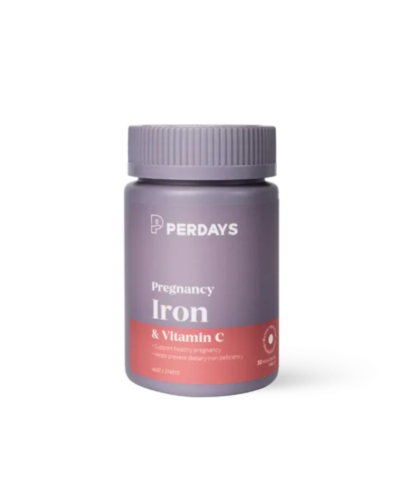By Latoya Cruz
In a Nutshell
• Iron is crucial in pregnancy for both mother and baby’s growth and development
• Iron needs increase significantly during pregnancy, especially after 12 weeks
• Aim for 30mg of iron daily from 12 weeks, potentially increasing to 40mg later
• Iron-rich foods (red meat, leafy greens) are ideal, but supplements may be needed
• Start iron supplements by 12 weeks to prevent deficiency and anemia
Introduction
Iron is an essential nutrient in pregnancy as it is required by both mother and baby for the growth and development of pregnancy. Pregnant women and rapidly growing infants are two of the most vulnerable population groups when it comes to iron deficiency.
In this article we look at why iron is needed, how much iron a woman needs in pregnancy and when to start introducing iron supplements.
Why Do Pregnant Women Need Iron?
During pregnancy, a woman’s blood volume increases and therefore her need for iron also increases. As the baby grows, their blood is also developing. Iron is needed to support this. As pregnancy progresses, more iron is needed to support the foetus, the placenta and to help increase maternal red blood cell mass.
An increase in iron will also help to increase the maternal oxygen-carrying capacity and will provide a buffer against blood loss during birth. Iron is needed for haemoglobin; meaning it will carry oxygen from the lungs to the cells. Iron will assist with the production of cellular energy and has a direct impact on maternal energy during her pregnancy.
Low iron during pregnancy may result in poor pregnancy outcomes such as low birth weight and preterm birth.
How Much Iron Is Needed In Pregnancy?
Iron needs will increase as the pregnancy progresses. It is recommended that a pregnant woman should consume 30mg of iron per day from 12 weeks’ gestation as this is when iron needs begin to increase. However, if you are low in iron when trying to conceive, then you will find you need to up your iron intake sooner rather than later.
Iron intake may then increase to 40mg of ferrous iron from 18 weeks’ gestation and can be consumed through a combination of both food and supplementation. Iron rich foods include heme sources such as red meat, fish, poultry and non heme sources like oats, hemp seeds, dark leafy greens, tofu, beans and legumes.
When consuming iron rich foods, it is best done so alongside a form of vitamin c such as citrus fruit, capsicum and broccoli and away from calcium rich foods like dairy. By doing so, you will enhance the absorption of iron.
When To Introduce An Iron Supplement
By consuming an iron supplement from 12 weeks’ gestation and onwards, a mother can reduce her risk of becoming iron deficient. Iron deficiency is the most common cause of anaemia before 24 weeks gestation. Therefore, iron supplementation should begin well before this stage. Haemoglobin concentration will rise during the third trimester, however substantial iron needs to be available in order for this to take place efficiently.
During the third trimester, a woman is more prone to constipation and abdominal discomfort, therefore a gentle, highly absorbable form of iron in the form of iron bisglycinate is most ideal to consume. As always, when making any changes to your diet and supplementation regime, we recommend doing so under the guidance of your healthcare practitioner.
By supporting iron intake earlier on in pregnancy, women are more likely to have adequate stores heading into birth, meaning they are able to replenish lost iron during labour due to blood loss. Women who are carrying multiple babies may require more iron as they are at a higher risk of iron deficiency.
It is suggested that women check iron stores via a blood test when trying to conceive, as well as in the first, second and third trimester and then again at 6 weeks postpartum.
Summary
An iron supplement is best introduced at 12 weeks gestation and carried right through to postpartum, unless a woman has a known iron deficiency prior to 12 weeks. Taking iron bisglycinate is most ideal as it is gentler on the stomach and more absorbable.
It is recommended to have your practitioner check your iron stores throughout pregnancy and discuss iron supplementation with your doctor prior to starting.
Support Your Pregnancy With Perdays Iron with Vitamin C
Perdays Pregnancy Iron & Vitamin C Specifically formulated for pregnant women to help support a healthy pregnancy. Our supplement contains highly bioavailable iron in the form of iron bisglycinate and vitamin C to optimize a healthy pregnancy.

Latoya Cruz is a qualified nutritionist, registered with the Australian Traditional Medicine Society (ATMS). Latoya has an interest in women’s health including fertility, pre and postnatal, hormonal health and supporting busy, burnt out mums.

